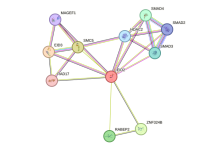It is contagious and known as whooping cough or pertussis in medical terminology. The disease cannot be prevented, and a newborn baby can contract it at any time after birth, unlike some other diseases. Infants are commonly affected by it during their first year of life when it is very severe and most of the deaths occur as a result.
Children under the age of 5 accounts for the majority of cases. Children up to the age of 12 may also be affected in some cases. It is possible for the disease to cause serious lung problems. Bacteria cause this highly infectious disease.
Droplet infection allows it to spread rapidly from child to child. Infectivity is particularly high during the early stages of catarrhal infection, but once a spasmodic attack begins, infectivity decreases dramatically. Eight to ten weeks are required for this disease to run its course.
Symptoms
There are two stages of the disease: catarrhal and spasmodic. In the first week, the cough is similar to an upper respiratory catarrh. The symptoms become spasmodic after a week and occur in bouts, first during the night, then later during the day. As the child coughs, he continues to do so. The face and tongue become red and suffused, the eyes water and the tongue protrudes.
A whoop is a prolonged croaking sound made by the child at the end of the bout. As the air enters the larynx, it produces this sound. This is what gives the disease its name. A sticky secretion comes out of the child’s nose and mouth, and he very often vomits. The child lies exhausted at the end of the bout. Over the next three or four weeks, the cough episodes and their duration gradually decrease, and the disease disappears after eight to ten weeks.
The disease is mild and atypical in immunized children. The severity of coughs can cause bleeding into the eyes, nose, lungs, and, in rare cases, the brain, resulting in convulsions. Due to the thick, sticky nature of the secretions blocking the passage of air to a part of the lung, lung complications such as collapse are common among young children. Pneumonia may result from secondary infection. In rare cases, the brain may be inflamed during convulsions.
Causes
The microorganisms Bordetella pertussis and Bordetella parapertussis are responsible for whooping cough. Infections caused by the first one are more severe. Adinoviruses, para-influenza, and respiratory viruses are also associated with whooping cough.
In reality, the disease results from not providing enough fresh fruits and salad vegetables to children and improperly feeding them refined and demineralized foods. Children with catarrh and mucus build up in their systems due to this condition. Catarrh and mucus are being thrown out by nature through the disease. Whooping cough can also be caused by drugs used to treat other diseases.
Treatment
A fast should be imposed on the child at the beginning of the treatment, and he or she should be given orange juice and water for a few days. Give him orange juice diluted with warm water 50:50. Milk or anything else should not be given to him. A warm water enema should be given to him every day during this period in order to cleanse his bowels. The use of a mild laxative such as castor oil is advised in the case of constipation.
The abdominal muscles will also be relieved of the pain caused by paroxysms of coughing. The throat and upper chest should be treated with cold packs as needed. Baths with Epsom salts are beneficial during this time. The patient should be placed on a fruit-only diet for a few days after the more severe symptoms have cleared.
Fruits like apples, oranges, pineapple, papaya, and orange should be consumed as part of this regimen. As soon as he has fully recovered, he will be able to eat a regular, well-balanced diet, taking into account his age. Milk and fresh fruit juices should be the mainstay of every diet. After a child has reached the convalescent stage, he or she should be encouraged to spend as much time out of doors as possible.
Natural Remedies
Whooping cough can be treated effectively with some home remedies. Garlic is one of the most effective remedies. Two or three tablespoons of garlic syrup should be given two or three times a day to treat this condition. Coughing spells that are frequent and violent should be treated more frequently. Another effective remedy for whooping cough is ginger (adrak).
Fresh ginger juice is an excellent diaphoretic when mixed with a decoction of fenugreek (methi) and honey. This disease is treated with it as an expectorant. It is beneficial to treat this disease with a syrup prepared by mixing a teaspoon of fresh radish (muli) with equal quantities of honey and rock salt. You should take it three times a day.
Whooping cough can be treated with almond oil (badam). Missed should also be given 10 drops of fresh ginger juice and white onion juice three times a day for two weeks. As a result, you will feel better.







